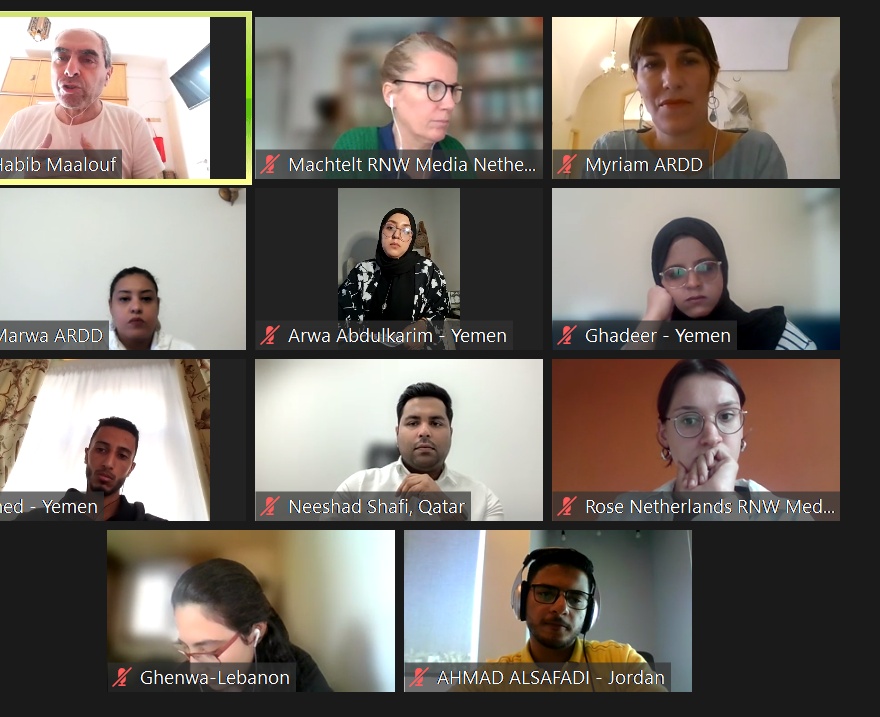The Arab Renaissance for Democracy and Development (ARDD), in partnership with RNW Media, held ‘The role of media in climate change mitigation policy lab on Monday, October 17th, within the framework of the Arab Youth Green Voices project funded by the Embassy of the Netherlands. Guest speakers at the event were Habib Maalouf, Lebanese writer, journalist, and lecturer in environmental philosophy, and head of the Association for Environment and Development, as well as head of the Environment Department at As-Safir newspaper, and Nishad Shafi, environmentalist, board member of Climate Action Network, and executive director of the Arab Youth Climate Movement based in Qatar.
The policy lab was attended by young climate change advocates from the MENA region selected through the “Green Voices” competition organized by ARDD and RNW Media. This policy lab is the first of a series of similar events and activities aimed at offering youths a space for debate, learning, building capacity, and enhancing their media content production skills with the support of experts and peers. Ten of the participants will also have the opportunity to participate in the COP27 side event held next month in Sharm El Sheikh, Egypt.
During the lab, young participants from Jordan, Yemen, Iraq, Palestine, Lebanon, and Egypt held productive discussions on the impact of climate change on their countries, developing countries’ difficulties in obtaining finances to tackle pressing climate issues, and the role of mainstream and independent media in raising public awareness and providing accurate and accessible information to the general public on this critical issue.
According to Myriam Marcuello Lopez, ARDD senior advisor who has moderated the discussion, “we are working with RNW media to prepare these youths to participate more actively and effectively in the climate change debate, including COP27, and these policy labs help them engage in thought-provoking dialogue and develop more creative communication tools to inform and influence the debate”.
Maalouf tackled the “philosophical root of the problem”, expressing the belief that “the beginning of the environmental problem goes back to some traditional and scientific considerations, which have given rise to the notion that human beings are the center of existence and all other species are to be used some way or another, which we did to the point of extinction”. According to him, “considering that humans are the most important creatures on the planet and not one of its many elements or diverse species, is the root of the environmental problem. Human beings did not take the lives of other species into consideration.
The dialogue further shed light on the critical issue of inequality between developed and developing countries, with the former responsible for most of the global climate crisis, and the latter incapable to take mitigating measures or adopting strategies addressing climate change.
According to Shafi, the energy security issues of Europe, and the ongoing Russia-Ukraine war can jeopardize promises and commitments. He also stressed that “developed countries largely control the road map for the Paris Agreement narrative, their own media and the road map for the Paris agreement, as well as the Conference of the Parties’ agendas”, reiterating that developing countries should insist on compensations and invest in a climate fund and climate technology, a “message that should be given greater attention by media”.
Ghenwa, a participant from Lebanon, cited the complexity of finding enough information on official government websites, which makes citizens rely mainly on the information presented by the media.
Ahmed, a participant from Yemen, said that political turmoil and wars in his country, as well as conflicts in other Arab countries, are given prominence by the media, just like news about the economy, while environmental issues are nearly ignored.
Shafi concurred, citing Palestine as an example that is constantly in the news for the conflict, while great initiatives like young people coming up with water recycling solutions and solar water-pumping systems in Gaza, as well as solutions in other countries in the region, do not get any coverage. While Maalouf called on the media to engage in “proactive journalism” that tackles environmental and climate issues and disasters before they occur.
Ghadeer, a participant from Yemen highlighted the importance of building digital platforms to discuss the environment, storytelling, and visibility materials.
Amr, a participant from Egypt, also believes that the media should take the extra step of calling for and endorsing public protests if there are issues that are seriously damaging the environment.
All participants agreed that local and regional media play a critical role in documenting countries’ strategies and youth initiatives to contain and mitigate climate change.
Wrapping up the discussions, the participants agreed that the Arab media also have a vital role to play in supporting their governments and highlighting the environmental challenges and their impact on countries. They also highlighted the important role youth should play in this regard, they called on engaged youth to use their social media accounts and web platforms to showcase such stories, as well as contact local journalists to help them make their stories heard globally, and to join youth-led programs that further amplify their voices.


